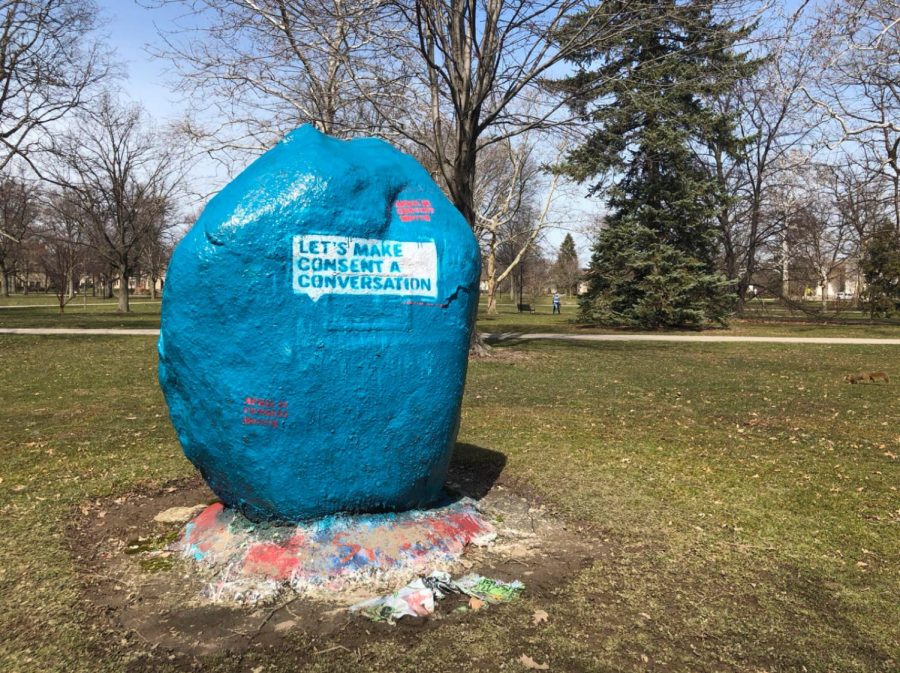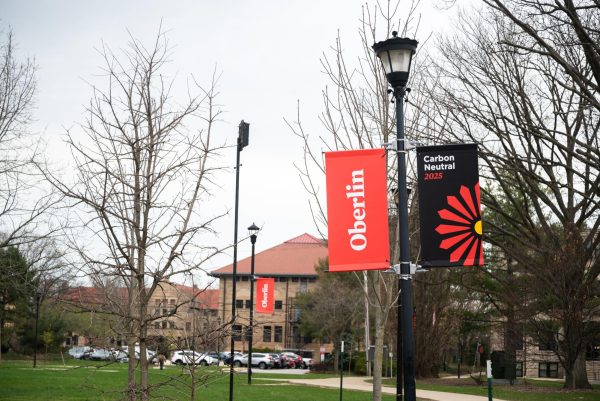Consent Month Reframes Sexual Conduct
Photo by Bryan Rubin, Photo Editor
Students from Preventing and Responding to Sexual Misconduct painted a rock in Tappan Square to celebrate Consent Month,which aims to spread awareness of healthy sexual and consent practices.
Editor’s Note: This article contains mentions of sexual assualt, violence, and misconduct.
Oberlin’s first official Consent Month debuts this April marking a collaborative effort between the Oberlin’s Office of Title IX, the student group Preventing and Responding to Sexual Misconduct, the Sexual Information Center, and the Office for Diversity, Equity, and Inclusion. There will be speakers, programs, workshops, and events in the coming weeks to raise awareness around consent and healthy sexual practices on campus.
PRSM — a group that started in 2014 as a training program for first-years that focuses on peer education, bystander intervention, and consent — and the SIC, which aims to provide access to at-cost safer sex supplies and peer counseling, will hold over a dozen events throughout the month. All of these events will count as prerequisites for Oberlin’s famous Drag Ball, an annual event that celebrates drag culture and requires students to attend various workshops and events in order to purchase a ticket.
“What I love about the idea of Consent Month is that it really nails home that [consent] isn’t just a first-year thing,” Title IX Director Rebecca Mosely said. “It also allows us to get creative in what we’re doing and how we’re doing it at a time when people will want to attend for more than just their own personal interest, though the ability to get into Drag Ball or count it for other things is a nice enticement as well.”
Nationally, April is Sexual Assault Awareness Month, and the College usually recognizes it by creating platforms for survivors of sexual assault to tell their stories. After years of framing the awareness month this way, Mosely and PRSM coordinators decided to keep the event in theme with the “Make Consent a Conversation” platform launched this year.
“We wanted to focus on work around sexual violence in some way, but obviously our campaign all year has been an awareness campaign around consent, which is a positive way, I think, to focus on preventing sexual violence,” Mosely said. “It made sense, fitting in with the campaign this year, to go ahead and make it Consent Month and really be focusing on that prevention work around sexual violence.”
The event’s organizers were also aware of the outpouring of survivor stories in the wake of the #MeToo movement and wanted to promote preventative rather than reactionary dialogue.
“I think with the emergence of the #MeToo movement, to be silent is a form of violence, but I think we have the opportunity as a community to kind of intervene and offer some nuance in these issues,” College junior and SIC Peer Counselor Kira Felsenfeld said. “So what does it look like when we look at this through a lens of race, or through a lens of thinking about gender and heteronormativity and cis-normativity?”
A large reason the events this month focus on bystander and preventative measures is that in Oberlin’s 2016 Climate Survey, students responded that a bystander was present in 47 percent of assaults. However, bystanders intervened in only 12 percent of these assaults.
“When I first started, we only did the consent workshops in the fall, and then because of the results of the Oberlin Climate Survey, we have begun to do the bystander workshops in the spring,” College junior and PRSM facilitator Sophia Pekowsky said. “That’s why we did these bystander interventions — to kind of train people to know how to be active bystanders and to always be on the lookout, and that involves really caring about the community.”
Some of the preventative events include “A Party Planning and Prevention Workshop” and “Bystander Intervention” training.
“I also think alcohol [is really relevant to consent] which is clear on college campuses, but I think at Oberlin it keeps falling out of the conversation, and as much as we talk about it in theory, where it’s like, ‘Yeah, you’ve had too much to drink,’ and that can inhibit consent, I think it’s just so, so central,” Felsenfeld said. “Party culture can really f**k up our ability to consent for things. And it’s also just, like, people go to parties with the goal to hook up with someone, and that can be incredibly dangerous.”
Pekowsky added that there is often a misconception at Oberlin that sexual assault is less prevalent here due to the progressive climate. However, according to the 2016 climate survey, one in five women at Oberlin and one in 12 men will experience some form of sexual violence during their time here — on par with the national average.
“People have this idea that there’s not sexual assault at Oberlin in the same way that there is on other college campuses, because a lot of the time sexual assault is seen as this thing that only happens in bigger state schools, or like an issue that’s isolated to fraternity houses,” Pekowsky said. “But sexual assault rates here completely are in the same percentage as in any other school.”
One Oberlin-specific problem that facilitators highlighted is the “chill” culture at Oberlin that discourages people from speaking up about their comfort level and sexual preferences for fear of jeopardizing their social standing.
“But I think the problems can manifest in different ways. I think there is a culture of apathy — it’s not cool to advocate for yourself, and to advocate for your boundaries, and in a hookup culture the need to be chill really silences the need for people to express their boundaries,” Pekowsky said. “And that’s not taking any of the fault off of perpetrators, but people do feel a pressure to feel comfortable with hookup culture and to be comfortable doing things that they might not actually feel comfortable with.”
In keeping with national shifts in conversations about consent and gender dynamics, this year’s series will feature many events focusing on men and masculinity and their role in consent, which breaks from the norm of asking what women can do to prevent assault.
Consent Month kicked off Tuesday night with “Men Preventing Sexual Violence: It’s More Than Just Asking for Consent.” Director of Campus Services for the Cleveland Rape Crisis Center Alex Leslie led the workshop, which, while open to all, discussed what men can do to prevent rape and assault.
The event drew around 50 people and was the second of its kind this year, with “Consent, Sex, and Relationships for Men” launching first last semester.
“Last semester was the first time we piloted a workshop specifically targeted to people who identify as men,” College senior and PRSM Facilitator India Wood said. “I talked to a lot of people before and after the workshop. … Most of the people I talked to, which is obviously a self-selecting population, were all really excited about the idea of it. A lot of people gave me the feedback that they were like, ‘No one ever talks about this, just in groups of dudes here,’ and how it’s a pretty important thing to be talking about, but there doesn’t really ever seem [to be] a space to do so.”
Another event aimed at tackling hypermasculinity is a screening of The Mask You Live In, a documentary that follows a number of boys and young men as they struggle to negotiate society’s expectations around masculinity.
“I feel like masculinity is something that isn’t really talked about at Oberlin that much and PRSM is trying to highlight, just because masculinity comes up as this issue that becomes present in so many cases of sexual assault,” Pekowsky said. “And even though obviously it’s not always men who commit sexual assault, and it’s not always women who are sexually assaulted — it’s so far from that — a lot of the times masculinity is still involved in very insidious ways. Even in queer relationships, masculinity can play a part in abuse.”
The Office of Title IX will also undergo a policy review this semester to revise its current policies and procedures. The Title IX Policy Review Committee has been gathering student input on the policy through surveys this spring. College junior and Student Senator Kirsten Mosjziszek will facilitate a Title IX policy listening session to gather student opinions on the changes.
A revised policy will be drafted by the end of the semester, which will then go to Student Senate for approval before reaching the General Faculty.







